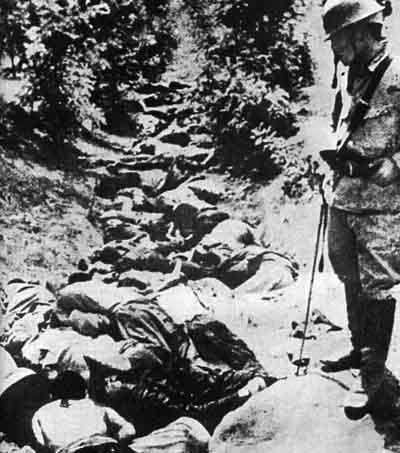Soldiers in WWII in Asia Radicalized by Own Diaries
- By Peter Harmsen
- 9 May, 2013
- No Comments
 Soldiers in World War II responsible for violent atrocities in the Far East may have been partly radicalised by their own dairies, new research shows.
Soldiers in World War II responsible for violent atrocities in the Far East may have been partly radicalised by their own dairies, new research shows.
Dr Aaron William Moore, from The University of Manchester, has been studying the private diaries of 200 American, Chinese and Japanese soldiers over the past ten years for a new book out next month.
The diaries he tracked down were written during the eight years of “total war”, in which up to 20 million Chinese died and resulted in 2 million Japanese military casualties.
One low point was the ‘Rape of Nanjing’ following the Japanese capture of the former capital of the Republic of China on December 13, 1937.
Hundreds of thousands of Chinese civilians and disarmed soldiers were murdered by soldiers of the Imperial Japanese Army.
“The state did not ‘brainwash’ these people into committing atrocities,” said Dr Moore.
“Rather, it was a number of factors, including their diaries, which they used to build up a rationale which normalised acts of extreme violence.”
One 1937 diary, found by Dr Moore, was written when Chinese Nationalist soldiers began seeking out and executing, suspected ‘traitors’ without trial.
Luo Zhuoying wrote that ‘every officer should search their vicinity for these traitors, selling their country and committing crimes, and execute them by firing squad.’
But Japanese troops also convinced themselves that acts of violence were acceptable:
Ōuchi Toshimichi was with one of the first units in Nanjing in 1937 where the massacre took place. Toshimichi wrote in his diary: ‘The Chinese army has become really despicable to me; I want us to wipe them out as quickly as possible.’
Even a US Christian Army Chaplain, Charles Trent, marked in his diary the numbers of ‘good’, meaning ‘dead’ ‘Japs’.
John Browning, an American artist and former Boy Scout, who witnessed the beheading of a Japanese captive by machete, wrote in his diary, ‘War is war, and the Geneva Red Cross Convention … is a long, long way from the front line. There is but one law here, KILL, KILL, KILL!’.
Dr Moore said: “Diaries, written by soldiers in wartime, can actually be quite dangerous: they are seen by their writers as repositories of unchangeable truths.
“These soldiers often come from ordinary backgrounds, but through their writing established a rationale for extreme behaviour, getting angrier and angrier. You can’t rewrite a document and you can’t change history.
“It’s also true that veterans in conflict – including Iraq – seem to have more difficulty in coming to terms with themselves if they have written a diary.
“If you are a soldier and decide to write a diary, you should think about your goal and the consequences of what you write.”
He added: “Battlefield reports have always been a requirement in the field of war. But as the twentieth century culture of reportage emerged, they became more personal.
“Personal diaries were officially not allowed on the front line , but it would have been hypocritical for officers to stop them, as they were writing something similar themselves.”
Writing War: Soldiers Record the Japanese Empire, by Dr Aaron William Moore is published by Harvard University Press in July.
This article first appeared on the website of University of Manchester (www.manchester.ac.uk)

 Copyright © 2025
Copyright © 2025
Leave a Reply